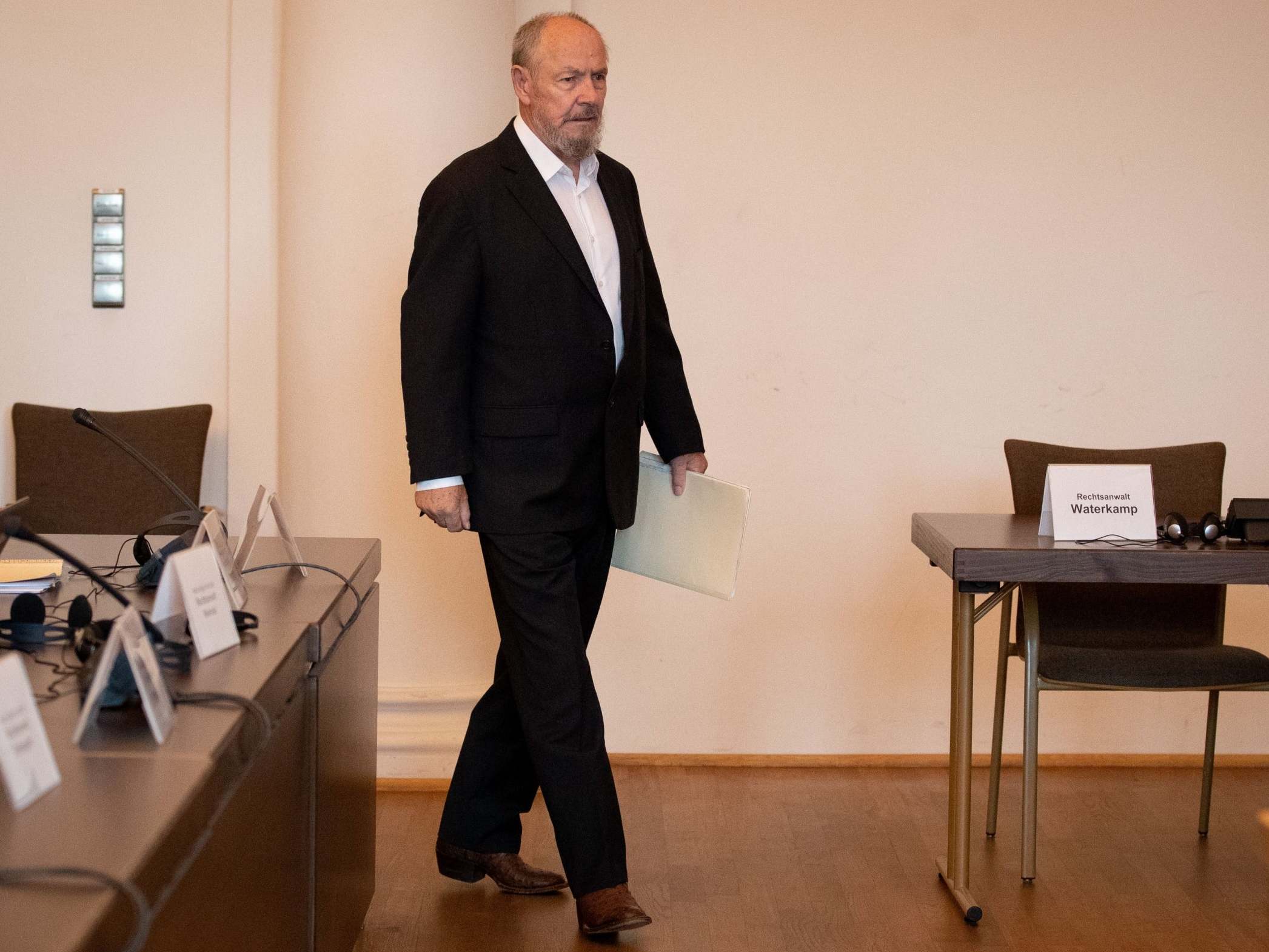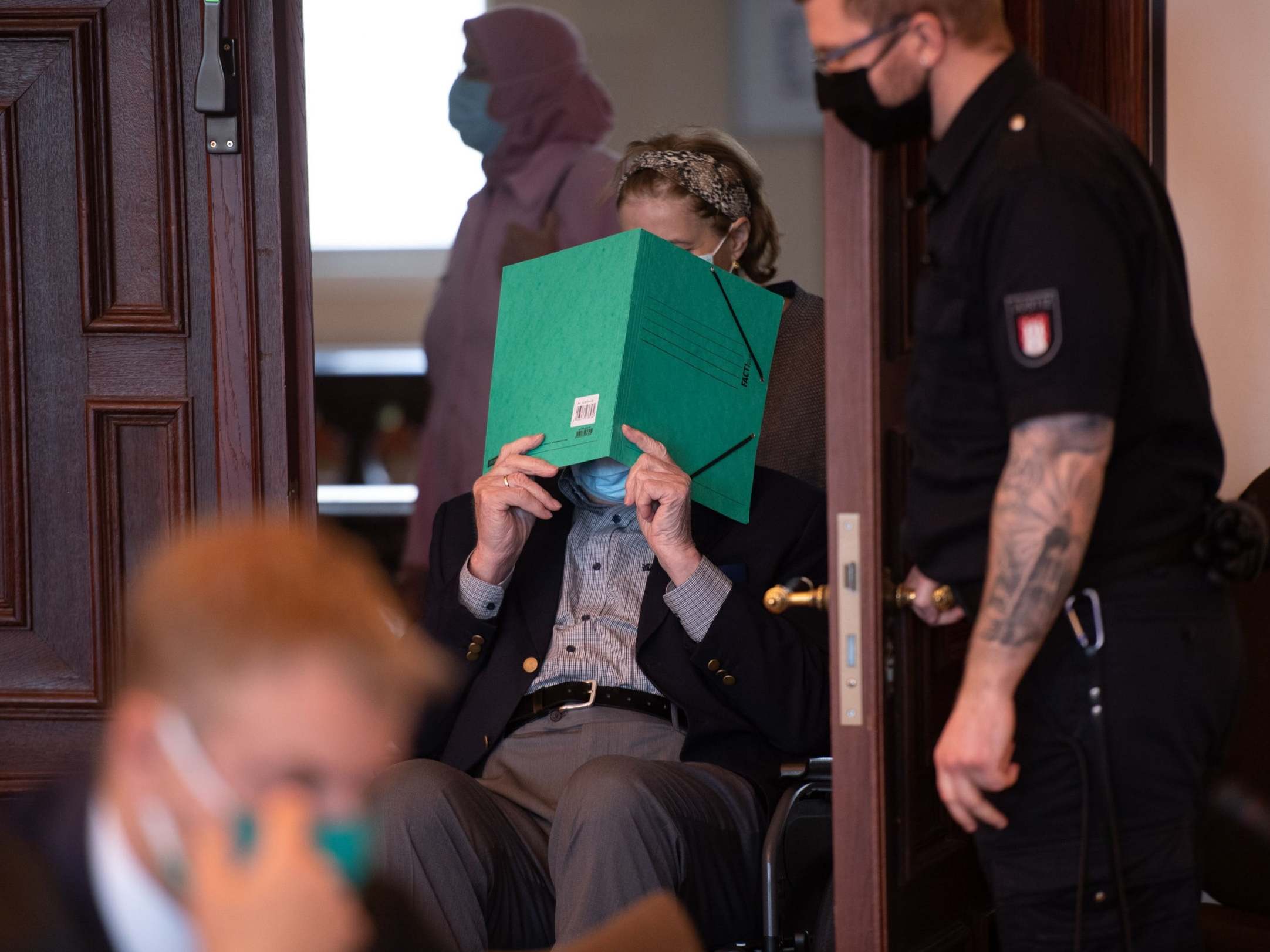The strange case of the Nazi camp guard and the fake Holocaust survivor
Moshe Peter Loth, a witness in a war crimes trial, said in his petition that he’d been tattooed as a child in the Stutthof camp and later had the tattoo removed – but it turned out to be a lie, writes Darren Richman


In November of last year, in a crowded Hamburg courtroom, Moshe Peter Loth performed a simple act that made headlines all over the globe. It was the seventh day of the trial of Bruno Dey, a former concentration camp guard accused of having aided and abetted in the murder of 5,230 people. Loth, a Florida resident who’d flown over for a trial expected to be one of the last of its kind, turned to the spectators and spoke to them as a man who’d joined the case as a co-plaintiff to testify as a Stutthof survivor. “Watch out everyone, I will forgive him now,” he said before embracing the man on trial. The thing about stories that seem too good to be true is that sometimes they are.
There is a reason the act struck a chord and the appeal of the gesture is clear since it suggests we, as humans, have a capacity for forgiveness however extreme the transgression. Ultimately the moment ended up highlighting an entirely different issue; the difficulties of establishing veracity in such cases.
This has been a hot button issue in recent times with The Devil Next Door on Netflix tackling the historic case of John Demjanjuk in a series built around survivor testimonies. The subject of the documentary may or may not have been Ivan the Terrible, a man so nicknamed as a result of his barbaric behaviour while serving as a concentration camp guard. Some of the trial footage includes testimony that ultimately turned out to be mistaken – but perhaps the passing of time and the emotional weight of enduring such inhumanity means inaccuracies are inevitable.
Earlier this year, Amazon’s Hunters sparked criticism for inventing aspects of the Holocaust. The show depicted prisoners at Auschwitz being forced to murder each other while being used in a game of human chess. Criticism seems more justified in this instance and the case more clear-cut even if the creator, the grandson of a Holocaust survivor, has claimed the show was never aiming for documentary-style realism like the 2015 Hungarian feature film, Son of Saul. The official Auschwitz Memorial Twitter account even interjected, stating: “Auschwitz was full of horrible pain & suffering documented in the accounts of survivors” and “Inventing a game of human chess… welcomes future deniers.”
The show’s creator, David Weil, responded: “It is true that Nazis perpetrated widespread and extreme acts of sadism and torture – and even incidents of cruel 'games' – against their victims. I simply did not want to depict those specific, real acts of trauma.”
Loth, the man at the heart of this latest controversy, was not a survivor of the camps. But was he deliberately misleading people like the team behind Hunters, or was this an honest mistake closer to the inaccurate testimony shown in The Devil Next Door? It is difficult to say. What is certain is that the man on trial, Dey, joined the SS in his teens and covered his face on arrival at the courtroom each day in a wheelchair. It is also a fact that, as a result of the ages of those involved, each trial day was limited to two hours and there were a maximum of two trial days per week prior to the hiatus that has seen much of the world put on hold.

The situation is complex because those involved in the trial are predominantly octogenarians and nonagenarians. It is up to the court to distinguish between memory and that which has been gleaned from reading in the decades since these atrocities occurred. It appears Loth, 76, had no intention to mislead the court but was misinformed and genuinely believed he was born inside the camp. Rajmund Niwinski, a lawyer representing some of the survivors in the case, believes Loth simply failed to dig deeply enough into his own past.
“The history of the camps and of the war is very complex. Research is difficult as the majority of documents regarding the camps have been destroyed.”
The wheels of justice turn slowly and that is why it has taken Dey a lifetime to face criminal proceedings: “Right after the war, only those directly connected to the crimes were targeted: some of the key figures like those in the Nuremberg trials and some lower-ranking people in separate trials. The guards, not directly connected to specific crimes, just weren´t on the radar of those prosecuting.”
If the amplification of his voice leads others to conclude that survivors and their testimonies are not to be trusted then the very purpose of the trial is under threat
The story that Loth has told over the years, as a public speaker and in his memoir, involves his Nazi grandfather turning in his grandmother and mother. The co-plaintiff claimed the Red Cross informed him he was born in the camp but according to information provided to the Jewish Telegraphic Agency by four major Holocaust archives, the woman identified by Loth as his mother (Helene Anna Flood) was released from the camp months before his birth. It now appears Loth was born into a Protestant German family near Gdansk. His grandmother died in 1943 but not in a concentration camp.
Niwinski believes that one of the many misconceptions about the camps is the belief, shared by many, that only Jews were killed there. It follows that someone might erroneously conclude that since their mother was sent to a concentration camp, ergo she must have been Jewish.
The lawyer believes the real mistake was a lack of scrutiny: “Before going public in the way he did, not only in the course of the trial but also in his capacity as a public speaker, he should have been more diligent – if not for his own sake, then out of responsibility towards true survivors and their families.”
This is a key point and feeds into the controversy surrounding Hunters. This is a crucial moment in time in terms of Holocaust memorial; the horrors of the middle of the last century are in the process of moving from living history to history as the survivors die out. Holocaust denial and antisemitism are on the rise with living witnesses few and far between.
The court, the public prosecutor and Loth’s lawyers should have been more critical of his claims – basically his admittance as co-plaintiff was based solely on his word
For Niwinski, the blame does not lie solely with Loth: “The court, the public prosecutor and Loth´s lawyers should have been more critical of his claims – basically his admittance as co-plaintiff was based solely on his word. The trial is, in my personal view, overloaded with historical and symbolic meaning. It is at the point where it becomes very difficult to confront an apparent survivor with critical questions.”
For the lawyer, this is a key point. While there is undoubtedly added significance attached to the proceedings, it should still be treated like a trial. It is undeniably hard to cross-examine survivors but it is essential in the pursuit of justice. The issue is further complicated by the fact that, in his petition to join the trial, Loth claimed he had been tattooed in Stutthof as a child and had later had the tattoo removed but this appears to be a flight of fancy.
Loth has now withdrawn from the trial and issued a statement pleading for forgiveness: “Please accept my most sincere apologies for having caused any problems.” He proceeded to urge the court to “work for justice”. The judge welcomed the withdrawal and said: “The court had the immediate impression that this witness was not reliable.” The most telling part of Loth’s statement was his assertion that: “All the things I said in the trial are true, to the best of my knowledge.”
Many relatives of survivors have had to rely almost exclusively on oral testimony since so little written proof survives. Loth claims to have spent the past two decades researching his family history and it seems more than likely he was sharing the facts as he understood them. In Niwinski’s words: “Having seen Loth’s behaviour in court, I have no reason to assume that he acted out of ill will or even intentionally tried to mislead the court and the public.”
Documentation was destroyed by the Nazis during the war’s final days for obvious reasons and many survivors have had to rely on oral reports to learn about the fate of their families. Loth is by no means unique in this respect but, being too young to recall the events, he could only trust what he was told. If the amplification of his voice leads others to conclude that survivors and their testimonies are not to be trusted then the very purpose of the trial is under threat.
One such survivor is co-plaintiff Zigi Shipper, a man who turned 90 this year and has devoted the last decade of his life to sharing his story in schools around Britain so that young people can learn about the dangers of prejudice and where it can lead. Born in Lodz, Poland, Shipper endured a succession of concentration camps including Auschwitz-Birkenau and Stutthof during his formative years but there is not a trace of bitterness in his voice as he explains the importance of the trial:
“This man should go to court so people know what he did but I don’t think he should go to prison. At his age, will he come out a better person? It won’t help anybody. The important thing is that our voices are heard.”
The fear is that the furore surrounding this one voice might drown out the ones that truly matter and that must not be allowed to happen. Shipper is one of many survivors who have spent their twilight years raising awareness of the Holocaust simply because it feels like a moral imperative. Loth should be viewed as an outlier since that’s exactly what he is and certainly not indicative of a wider trend.
Almost eight decades on from these terrible crimes, one is left wondering whether justice delayed is justice denied or whether the arc of the moral universe bends towards justice. The court will need to determine the value of the testimony in each and every case and the curious situation involving Loth does not aid matters as the horrors of the past begin to become the stuff solely of text books. It is crucial that the world realises the honesty and integrity of Holocaust survivors since this is an isolated incident and feels, above all else, like an honest mistake.
Niwinski, a man waiting for abnormal proceedings to resume once the world returns to some semblance of normality, is unequivocal: “It is inevitable that the trial is also a history lesson and has a big symbolic meaning. But it is still, after all, a murder trial. With 5,230 murder victims, the trial should not have to rely on symbolism and historical context to be taken seriously.”
Join our commenting forum
Join thought-provoking conversations, follow other Independent readers and see their replies
Comments